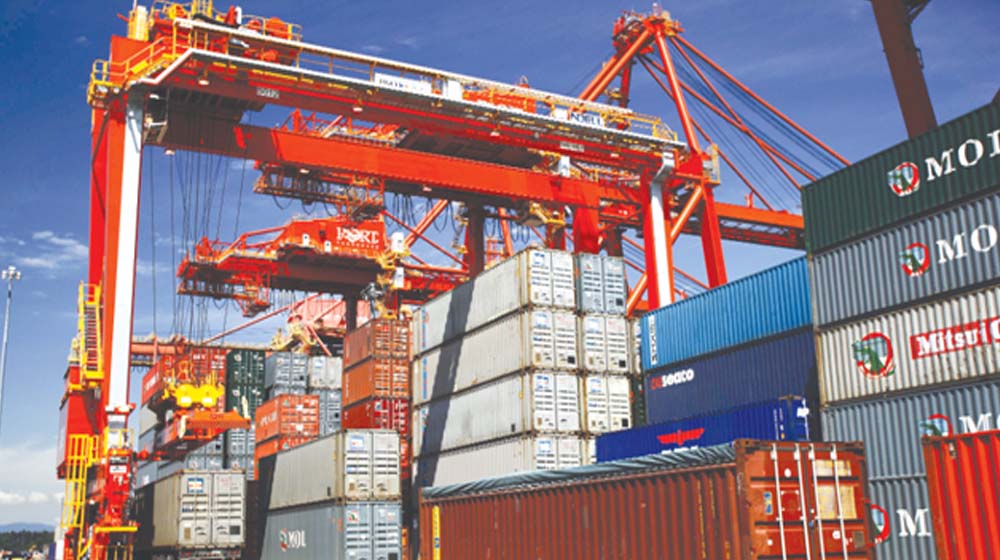Imports for March went down to $3.30 billion, down by 19.80% as compared to $4.19 billion in February 2020. The Trade deficit was recorded at $1.49 billion in March 2020 as compared to $2.04 billion in February 2020, down by 27.04% month on month.
However, in March 2020, Pakistan’s trade deficit was reduced by 30% to $1.49 billion as compared to $2.15 billion recorded in the same month of 2019. This is the lowest trade deficit recorded since February 2015 and 61 month-low, according to a report by Arif Habib Ltd.
Year on year, March exports were down by 8.46% to $1.80 billion as compared to $1.97 billion recorded in March 2019. However, the imports were down by 19.85% to $3.29 billion as compared to $4.11 billion in 2019.
Trade deficit down due to falling imports
While talking to ProPakistani, Dr. Aadil Nakhoda, an economist and Assistant Professor at IBA, Karachi, said:
“This is as expected. Exports have decreased due to a slowdown in global economy. However there is an uncertainty in exports as there is a delay between when orders are placed and receipts reported. Low demand from EU and US buyers of consumer goods that Pakistan typically sells to is likely to persist if the pandemic is not controlled. It will be interesting to see how the food group reacts in terms of exports as that comes under essential products for Pakistan as well as its trading partners.”
Imports are falling faster than exports, which has led to a decline in trade deficit. Furthermore, he stated that this is not a good sign as a driver of the decrease in imports is price adjustments in oil due to lack of global demand and Saudi-Russia spat.
Dr. Aadil Nakhoda further added that it will become ever more challenging for the exporters as they will need to improve their market intelligence. He said the current figures for exports may not be fully reflecting the fall in economic activity if orders were placed in advance. However, there may be adjustments to payment schedule and concessions may have been provided by the exporters to customers abroad. “Unfortunately, the numbers do not reveal the complete picture,” he added
He further added that imports were down due to price adjustments (also likely seen in exports of commodities) in major commodities, particularly fuel. The demand in Pakistan for imported goods is likely to be adversely impacted as well. The results will become apparent in subsequent releases on trade data by PBS. It is important to mention that year-on-year values have been typically on a downward trend in recent years though, implying the government policies to curtail imports.
“We have to worry if exports do not adjust back as quickly,” he added while stating that oil prices are likely to adjust once pandemic issues are mitigated and demand starts increasing.
Falling Oil Prices likely to benefit Pakistan
A.A.H Soomro, managing director at Khadim Ali Shah Bukhari Securities stated,
“It’s a herculean task to factor in the forecast for trade numbers for the next two months. For sure, the export markets are shut but the economy needs to import bare minimum to keep it breathing. At the moment, what matters most to the market, companies, and government is the resumption of life after Corona subsides. That said, falling oil prices are likely to save $300-400 million per month in imports as a new-normal. That’s handy in times like these.”
During the nine months (July-March), the country’s exports recorded a minimal increase of 2.23% as they were $17.45 billion as compared with $17.07 billion in the same period of the previous year. However, the imports have gone down by 14.42% to $34.81 billion in July-March of 2019-2020 as compared to $40.67 billion.
The trade deficit for the first nine months of the fiscal year (FY20) saw a decline of 26.45% as it was reported at $17.36 billion as compared to $23.60 billion.
Osama Rizvi, an economic and geopolitical analyst, stated that he had pointed this out before.
“Covid-19 has put the global economy into a tailspin. This has caused a slowdown in world commodity and financial markets. While the fall in oil prices is beneficial for consumers like us, it isn’t conducive enough. It has its downturn, which is a sluggish demand from our export markets”
Moreover, the recent lockdown has also hampered the capability and capacities of our domestic players, he added.
“It is evident, hopefully, that the pandemic will be over and European/Western markets will re-open. But we might have to wait till the whole world synchronizes and the flow of orders is met by production facilities in working order here,” added Osama.






















Goverment should give special subsidies on routine uses of things on daily basis